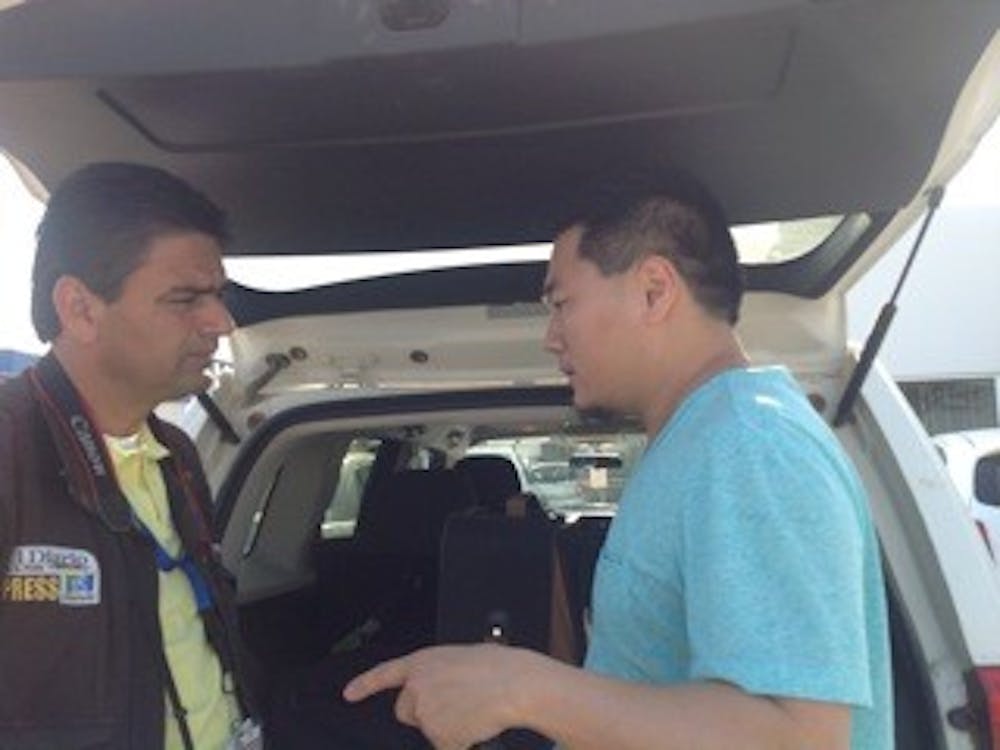 Director Charlie Minn and camera man Cesar Flores in Culiacan. (Photo Courtesy of Charlie Minn)
Director Charlie Minn and camera man Cesar Flores in Culiacan. (Photo Courtesy of Charlie Minn)Before going into Harkins Valley Art on Monday to see “Es El Chapo?” I knew very little about Mexican drug lord Joaquín Guzmán Loera, often referred to as "El Chapo." I was aware that both the U.S. and Mexican governments considered him to be the most dangerous drug trafficker in the world, and that he was arrested at the end of February this year. As to the details of his capture, his background and the world in which he lived, I remained uneducated.
Seeing that the film was in a nearby theater, I wanted to take the opportunity to learn as much about the issue as possible, as quickly as possible — a strategy that usually does little good. In this case, it’s safe to say that watching the movie paid off. Featuring many interviews with authors and experts on drug trafficking, and with many Mexican citizens, Director Charlie Minn mostly tried to answer two questions: Was the real El Chapo arrested? Was the Mexican government involved in making the arrest?
Statistics shown towards the beginning of the film showed that a majority of Mexican people believed the real El Chapo wasn’t being detained. Of those interviewed in the movie, most people, though casually stating their opinion, did not know what to believe. They suspected involvement on the part of the Mexican and U.S. governments and often refused to believe that the “real El Chapo” would let himself be captured in a public condominium complex, let alone visit there without a single one of his 200 personal guards. Some accused Mexican government, specifically president Enrique Peña Nieto, of plotting an arranged arrest of El Chapo to show Mexico’s strength in the war against drugs. Others believed that the government would not take this risk, for it would not be worth a major embarrassment if the public were to uncover the truth.
The film covered protests and riots that took place after El Chapo’s arrest. Protestors were calling for his release from prison, terrified that without the steady flow of money and employment that Guzmán provided for the country, the economy would fall apart. I had not realized how highly the character of drug lords was upheld in Mexico. In Culiacán, Jesús Malverde, the patron saint of illegal drug trade, has a shrine that the public can visit to make petitions to a painted bust of the man.
El Chapo was often called a great man who created thousands of jobs and helped others to provide for their families. He often came to the help of people in need. The public did, however, get upset when blood was spilt in public. When the business of the cartels was left behind closed doors, they seemed not to care; people had jobs and were able to survive.
“Es El Chapo?” ended, unsurprisingly, without any real answer to its two main questions. The most important point that I latched on to was a simple one: Drug trafficking did not end with the capture of El Chapo. Demand for drugs here in America and across the world has not lowered, and there will always be someone waiting to fill the shoes of a killed or captured leader. Also, I was left with a feeling of mistrust towards U.S. and foreign leaders. Corruption seems to be everywhere, so how can we trust those in charge to put stops to all the issues they publicly disapprove?
Reach the reporter at wruof@asu.edu or follow him on Twitter @willruof




